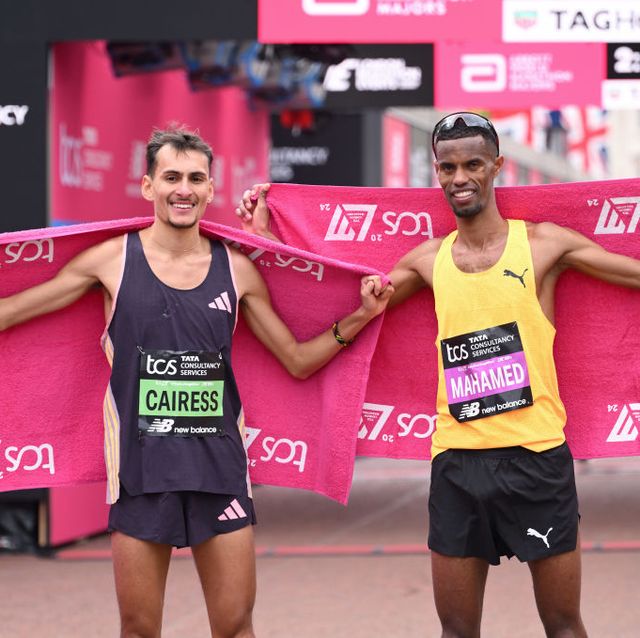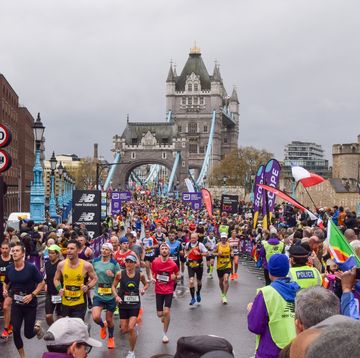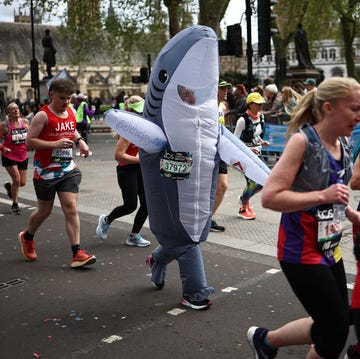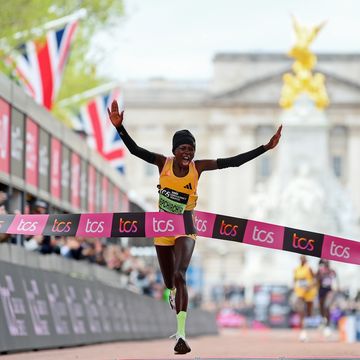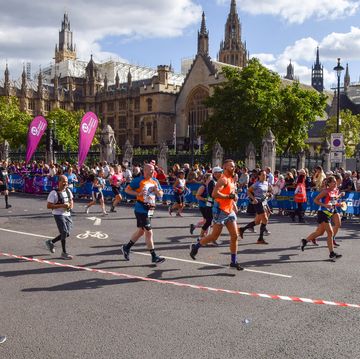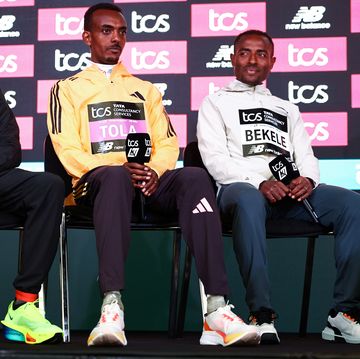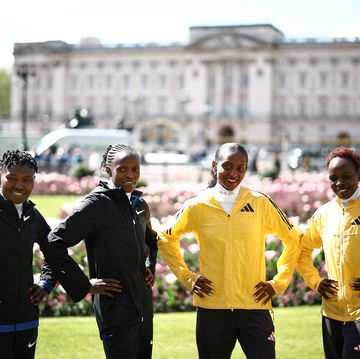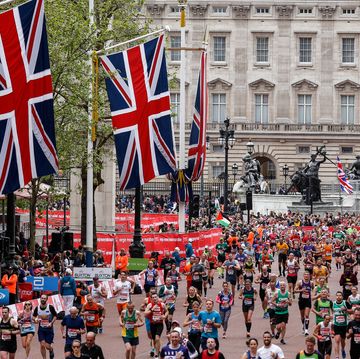If you’ve never previously heard of Emile Cairess, chances are you know of him now. The 26-year-old cruised to third place in the elite men’s race at yesterday’s London Marathon [21 April 2024] in a sublime time of 2:06:46, becoming the second-fastest British marathon runner ever in the process.
This was only his second shot at the marathon distance – and the first time that a British man has placed on the London Marathon podium since Sir Mo Farah’s third-place finish in 2018.
Cairess on course for Paris
A sizeable PB, Cairess’s time at the 2024 London Marathon falls comfortably within the qualifying mark of 2:08:10 for the men’s marathon at the 2024 Paris Olympic Games. Even his previous best of 2:08:07 – scored at the 2023 London Marathon, where he was first Brit and sixth man home on his debut performance – was an Olympic qualifying time, exemplifying his immediate talent over 26.2 miles.
As such, although not yet a sealed deal, the Yorkshireman has essentially cemented his place on Great Britain’s Olympic team for the men's marathon. In doing so, he’ll join long-standing training partner Phil Sesemann, who was a pacer at this year’s London Marathon and whose rapid result of 2:08:04 at the Seville Marathon in February confirmed his Team GB selection earlier this year.
On Sunday in London, as at other times elsewhere, Cairess needed no elaborate wrist technology to log his pace, distance, heart rate and more. Just a trusty orange Casio and a solid sense of his own body saw him through with impeccable form – a simple approach to a sublime result.
Cairess is continuing his upward trajectory to faster times and greater fame in the running sphere. In addition to his London Marathon successes, for example, he is currently third on the UK all-time rankings for 13.1 miles – thanks to his punchy PB of 60:01 at the 2024 Napoli City Half Marathon – and he holds the British 10-mile record.
But he’s anything but content. In fact, we’re still only seeing the early stages of Cairess’s career. While happy to finish third at this year’s London Marathon, Cairess still craves a quicker time and has his sights set on breaking Farah’s British marathon record of 2:05:11 very soon.
‘I wanted to run a quicker time, but the conditions were not right today – it was very windy,’ he said after Sunday’s race. ‘It could be quite gusty in some areas. But I’m really happy to come third, although I feel like I just snuck into third. I wasn’t up there fighting with the guys [Alexander Manyao and Kenenisa Bekele, who placed first and second respectively], but I’m happy and qualifying for the Olympics is great.
‘I had a good pace team, but apart from that there weren’t really any other competitors,’ he continued, reflecting on a marathon that saw him run solo for almost the entire duration. ‘So maybe in Valencia or Seville, something in a big group – maybe I’ll target [Farah’s British marathon record] next time.’
Mahamed makes the mark
Cairess wasn’t alone in theoretically booking his ticket to Paris with Team GB on Sunday. Fellow 26-year-old Mahamed Mahamed – who, like Cairess, ran only his second ever marathon at the weekend – also ran an Olympic qualifying time of 2:07:05, placing him fourth in the race and third on the UK all-time rankings for the marathon. That’s quite some result on the road for the two-time winner of the English National Cross Country Championships.
‘To finish fourth is honestly amazing for me,’ he said, shortly after crossing the finish line. ‘I’m happy with my position today. The main thing is to qualify [for the 2024 Olympic Games], so to get the time and go to Paris is a dream come true. I’m over the moon, really.’
Although yet unannounced, Mahamed, Cairess and Sesemann will be the three hopefuls representing Great Britain in the men’s marathon at the Paris Olympic Games – and in competitions beyond that, too. ‘We’re getting better – we’re trying to improve,’ asserted Cairess, contemplating the current standard of elite British marathon running. ‘Give me, Mahamed and Phil a few more years and I’m sure we’ll do GB proud.’
A first-timer and a 41-year-old complete the podium
Beyond the Brits, the 2024 London Marathon welcomed a brand-new winner of the elite men’s race – Alexander Munyao.
On his London Marathon debut, Munyao, 27, broke the tape in a time of 2:04:01, making this his first – and probably not last – Abbott World Marathon Majors victory.
Level with Ethiopian distance legend Kenenisa Bekele until the 40km mark along Embankment, Munyao then kicked ahead to create a decisive six-second gap. The Kenyan managed to cling onto his lead and extend the gap as he wound around St James’s Park before taking the win on The Mall.
At around 40km, that is where I thought I could win this marathon,’ he said, after his win. ‘It means a lot – and I see many good things coming in front of me.’
Munyoa also took the race as an opportunity to remember fellow Kenyan Kelvin Kiptum, the marathon world record holder who set the men’s course record of 2:01:25 in London in 2023, and who tragically died in a car crash in February. ‘Kiptum was in my thoughts today,’ he said. ‘Let him rest in peace.’
Enduring Bekele, meanwhile, cannot be underestimated. Although a London Marathon title has always eluded him, the 41-year-old is still the third-fastest marathoner of all time and continues to prove that age is no barrier to greatness. Completing the London Marathon course for the fifth time, in 2:04:15, Bekele – who is 14 years Munyao’s senior – broke his own over-40s marathon record on Sunday and is no less ambitious than he was at the start of his career.
‘Even though I couldn’t achieve what I expected, I was not 100% injury free,’ he said, noting how he felt a pull in his lower back around the 35km mark. ‘But this result was great, what I achieved today … I like the fans here, the city, the London Marathon.’
And while he sees himself racing marathons for no more than another two or three years, Bekele won’t write himself off yet. ‘Believe me, this [Bekele’s 2024 London Marathon result] is not my time,’ he said. ‘I expect faster than this time.’
